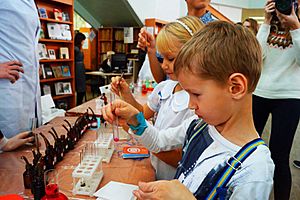Chemistry education facts for kids
Chemistry education is all about how we teach and learn chemistry. It's a big part of STEM education, which includes science, technology, engineering, and math. People who study chemistry education want to know how students learn chemistry best. They also look for the most effective ways to teach it. The goal is always to make chemistry lessons better and help students learn more. This can be done by trying new teaching methods and training teachers well. Chemistry can be taught in many ways, like classroom talks, cool demonstrations, and hands-on lab activities.
Contents
Why Chemistry is Important
Chemistry is super important because it helps us understand the world around us. Everything, from the stars to our own bodies, follows the rules of chemistry. It's often called "the central science" because it connects physics with biology and other applied sciences.
Chemistry is used in many areas, like making food, creating medicine, running factories, and protecting the environment. Learning chemistry helps students understand the scientific method. It also helps them develop skills like critical thinking, solving problems, and communicating ideas. Learning chemistry when you are young can even make you more interested in a STEM career later on!
How Chemistry is Taught
One common way to teach chemistry is through lectures combined with lab work. Lab classes became a key part of chemistry lessons in the late 1800s. A German scientist named Justus von Liebig was a big reason for this change. He was one of the first chemists to have a lab where students could do experiments.
His ideas spread to the United States thanks to Eben Horsford and Charles W. Eliot. Horsford set up the first chemistry lab course at Harvard University. Eliot later took charge of it and helped make lab work popular across many schools. Today, big chemistry groups like the American Chemical Society and the Royal Society of Chemistry require students to spend many hours in the lab to earn a chemistry degree.
However, some people are now asking if lab courses are still the best way to learn. They wonder if labs truly help students learn more. Researchers are trying to find out what makes lab work special and if it's worth all the time and money.
Learning About Learning Chemistry
There are different ways people think about how chemistry education works.
How Teachers Teach
One way to look at it is through the eyes of the teachers themselves. What they do in the classroom every day shapes what chemistry education really is.
Chemistry Education Research (CER)
Another important way is through chemistry education research (CER). This is like science for teaching and learning chemistry. Researchers in CER want to help students learn chemistry in a way that makes sense and is useful. They study:
- How students build their understanding of chemical ideas.
- How students learn practical skills in chemistry.
- How these findings can help design better lessons and teaching methods.
CER often uses ideas from how science is taught in younger grades and applies them to college-level chemistry. Researchers usually study real students in schools and colleges. They collect information in different ways, like using surveys and statistics (quantitative methods). They also do interviews, watch classes, and look at student work (qualitative methods).
Teachers Learning About Teaching
There's also a growing idea called The Scholarship of Teaching and Learning (SoTL). This is when chemistry professors learn more about how to teach effectively. They study their own teaching methods and how students truly understand chemistry.
Thinking About the Big Picture
In recent years, some researchers have suggested a "systems thinking" approach for chemistry education. Usually, chemistry breaks down big topics into smaller parts to study them (a "reductionist approach"). This is good for learning details.
But to solve big problems like climate change or pollution, we need to see how everything connects. A systems thinking approach helps students understand how chemistry relates to larger issues in society. The idea is that combining both ways of thinking can help create chemists who can solve global problems.
What You Can Study in Chemistry
If you're interested in chemistry, there are many paths you can take in college. In the U.S., you can get degrees specifically in chemistry education, like a:
- Bachelor of Science in Chemistry Education
- Master of Science in Chemistry Education
- PhD in Chemistry Education
Some colleges also offer chemistry degrees with a focus on education. For example, you could get a:
- Bachelor of Science in Chemistry with Specialization in Chemical Education
- Masters of Art in Chemistry with an Emphasis in Chemical Education
If you just want to study chemistry in general, you can major in areas like:
- Chemistry
- Chemical engineering
- Biochemistry
- Environmental Chemistry
- Analytical chemistry
- Forensic Chemistry
Images for kids
See also
 In Spanish: Educación química para niños
In Spanish: Educación química para niños
- Advancing Chemistry by Enhancing Learning in the Laboratory
- Constructivism in science education
 | Selma Burke |
 | Pauline Powell Burns |
 | Frederick J. Brown |
 | Robert Blackburn |



